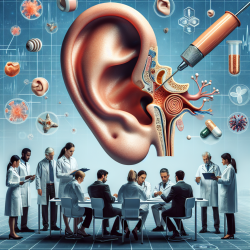Introduction
In the realm of speech-language pathology, the pursuit of improved cognitive outcomes for children is a critical focus. With a growing interest in nootropic botanicals, practitioners are exploring their potential to enhance cognitive functions such as memory, attention, and mood. The research article "The Safety and Efficacy of Botanicals with Nootropic Effects" provides valuable insights into the efficacy and safety of these botanicals, offering a data-driven approach to integrating them into therapeutic practices.
Understanding Nootropic Botanicals
Nootropic botanicals, such as Bacopa monnieri, Ginkgo biloba, and American ginseng, have been traditionally used to support cognitive health. These botanicals are gaining attention for their potential to enhance cognitive functions, particularly in children who may benefit from improved attention, memory, and focus. The research highlights the growing market for brain health supplements, projected to reach $5.8 billion by 2023, reflecting the increasing demand for cognitive enhancers.
Data-Driven Insights from the Research
The article provides a comprehensive review of clinical efficacy data for various botanicals, emphasizing their potential benefits in cognitive enhancement. For instance, Bacopa monnieri has shown promise in improving memory and attention, with studies indicating significant improvements in cognitive performance in both healthy individuals and those with cognitive impairments.
- Bacopa monnieri: Known for its memory-enhancing properties, studies have demonstrated improvements in cognitive performance and memory retention.
- Ginkgo biloba: Widely studied for its effects on cognitive function, Ginkgo biloba has shown potential in improving memory and attention, particularly in older adults.
- American ginseng: This botanical has been linked to improvements in working memory and mood, offering potential benefits for cognitive enhancement.
Implementing Botanical Nootropics in Practice
For practitioners in speech-language pathology, the integration of botanical nootropics into therapeutic interventions requires a careful, evidence-based approach. The research underscores the importance of standardized extracts and well-conducted clinical trials to ensure safety and efficacy. Practitioners are encouraged to consider the following when implementing botanical nootropics:
- Utilize standardized extracts with proven efficacy and safety profiles.
- Monitor for potential interactions with other interventions or medications.
- Engage in continuous education and research to stay informed about emerging evidence.
Encouraging Further Research
While the current research provides a solid foundation, there are still data gaps, particularly concerning long-term safety and efficacy in children. Practitioners are encouraged to advocate for and participate in further research to explore the full potential of botanical nootropics in enhancing cognitive outcomes in children. Collaborative efforts between researchers, clinicians, and educators can lead to innovative approaches and improved therapeutic outcomes.
Conclusion
Botanical nootropics present an exciting opportunity to enhance cognitive functions in children. By leveraging data-driven insights and evidence-based practices, speech-language pathologists can explore the potential of these botanicals to support cognitive development. As the field continues to evolve, ongoing research and collaboration will be key to unlocking the full potential of botanical nootropics in therapeutic settings.
To read the original research paper, please follow this link: The Safety and Efficacy of Botanicals with Nootropic Effects.










